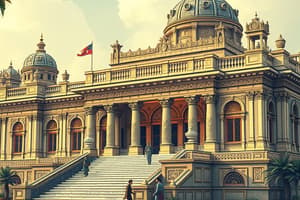Podcast
Questions and Answers
What is the highest court in the Indian judiciary?
What is the highest court in the Indian judiciary?
- District Court
- High Court
- Subordinate Court
- Supreme Court (correct)
What is required for a judge of the Supreme Court to be removed from office?
What is required for a judge of the Supreme Court to be removed from office?
- Two-thirds majority voting in both houses of Parliament (correct)
- Simple majority vote in Parliament
- Resignation of the judge
- Approval from the President only
Which type of jurisdiction allows the Supreme Court to hear a case for the first time?
Which type of jurisdiction allows the Supreme Court to hear a case for the first time?
- Advisory jurisdiction
- Appellate jurisdiction
- Exclusive jurisdiction
- Original jurisdiction (correct)
Which of the following is NOT a qualification for being a judge of the Supreme Court?
Which of the following is NOT a qualification for being a judge of the Supreme Court?
Who appoints the judges of the Supreme Court of India?
Who appoints the judges of the Supreme Court of India?
What action can the Supreme Court take regarding disputes between states?
What action can the Supreme Court take regarding disputes between states?
What role does the Supreme Court of India play in relation to the president's legislative actions?
What role does the Supreme Court of India play in relation to the president's legislative actions?
What is the term of office for judges of the Supreme Court?
What is the term of office for judges of the Supreme Court?
What kind of jurisdiction does the Supreme Court have over cases already disposed of by a High Court?
What kind of jurisdiction does the Supreme Court have over cases already disposed of by a High Court?
What is judicial review in the context of the Supreme Court of India?
What is judicial review in the context of the Supreme Court of India?
Which of the following describes the function of a court of record?
Which of the following describes the function of a court of record?
What is a writ of habeas corpus used for?
What is a writ of habeas corpus used for?
What authority does the High Court have over subordinate courts?
What authority does the High Court have over subordinate courts?
Which is a requirement for becoming a High Court judge in India?
Which is a requirement for becoming a High Court judge in India?
Under what circumstance can the High Court transfer cases to itself?
Under what circumstance can the High Court transfer cases to itself?
What constitutes subordinate courts in India?
What constitutes subordinate courts in India?
What is the maximum age at which a High Court judge must retire?
What is the maximum age at which a High Court judge must retire?
Flashcards are hidden until you start studying
Study Notes
Judiciary Overview
- The judiciary is the third branch of government, responsible for interpreting laws, punishing law violators, and protecting citizens' rights.
- Comprises three levels: Supreme Court, High Courts, and Subordinate Courts.
The Supreme Court
- Highest court in India, located in Delhi.
- Responsible for interpreting the Constitution and legislative laws.
- Judgements are binding on all lower courts.
Composition and Structure
- Consists of the Chief Justice and 30 other judges.
- Chief Justice is appointed by the President based on council advice.
- Other judges are appointed by the President with advice from both the Council of Ministers and the Chief Justice.
Qualifications for Supreme Court Judges
- Must be an Indian citizen with at least 5 years as a High Court judge or 10 years as a High Court advocate.
- Should be recognized as a distinguished jurist in the President's opinion.
Terms of Office
- Judges serve until 65 years of age.
- Their removal requires proven misbehavior and a two-thirds majority vote in both Houses of Parliament.
Powers and Functions
-
Jurisdiction Types:
- Original jurisdiction: Exclusive right to hear cases involving disputes between states or between states and the union government.
- Appellate jurisdiction: Right to hear appeals from lower High Courts.
- Advisory jurisdiction: Advising the President or interpreting laws prior to signing bills.
-
Judicial Review: The power to interpret the Constitution and declare laws void if conflicting with the Constitution.
-
Court of Record: Maintains permanent records of proceedings, sets legal precedents, and can punish for contempt.
Issuing of Writs
- The Supreme Court can issue writs to enforce rights:
- Habeas Corpus: Protects individuals from illegal detention; court can order release.
- Mandamus: Commands public officials to perform their duty when they fail to do so.
Final Authority
- The Supreme Court's decisions are final and uniform across India, with the exception of military law.
The High Court
- The highest court at the state level, led by a Chief Justice and other judges as deemed necessary by the President.
- Judges are appointed in consultation with the Chief Justice of the Supreme Court and the state governor.
Qualifications for High Court Judges
- Must have held a judicial office or been an advocate for at least 10 years.
Terms of Office
- High Court judges serve until 62 years of age and may resign or be removed by the President. They can also be transferred to different courts.
Functions of High Court
- Issues writs and orders to protect Fundamental Rights.
- Oversees subordinate courts, can demand their records, and ensure uniformity in constitutional interpretation.
Subordinate Courts
- Comprise District and Sessions Courts, Provincial Courts, and Nyaya Panchayats.
- District judges appointed by the Governor with High Court consultation.
- Handle civil (property, contract) and criminal (theft, murder) cases.
- Uniform structure and function across the country, supervised by the state High Courts.
Studying That Suits You
Use AI to generate personalized quizzes and flashcards to suit your learning preferences.



